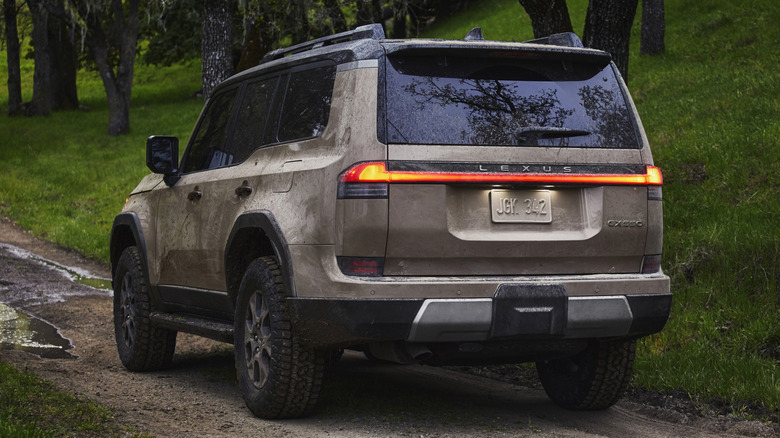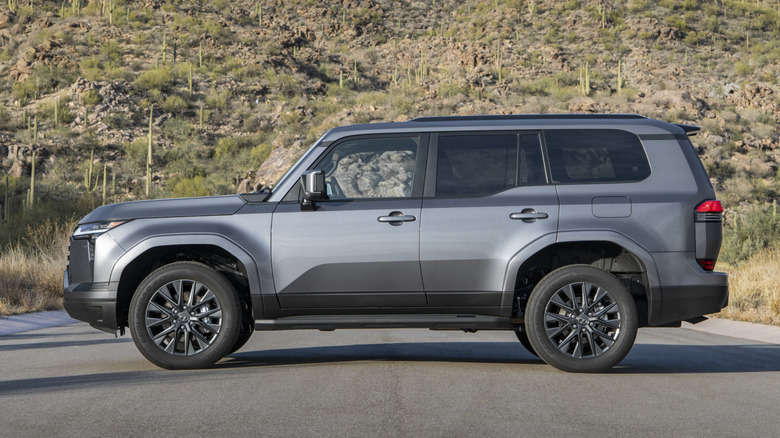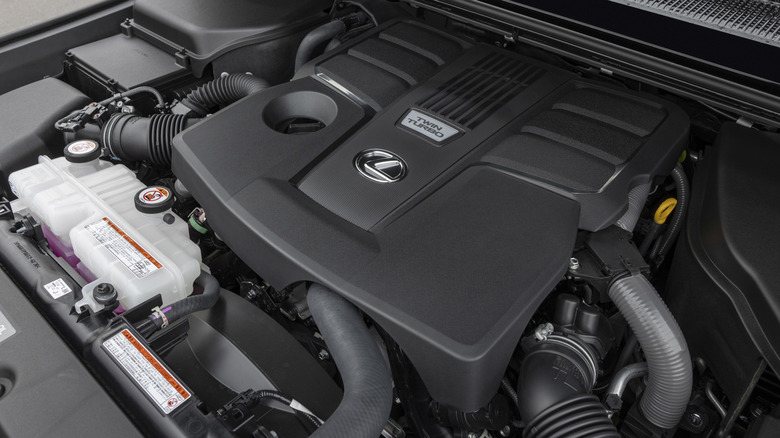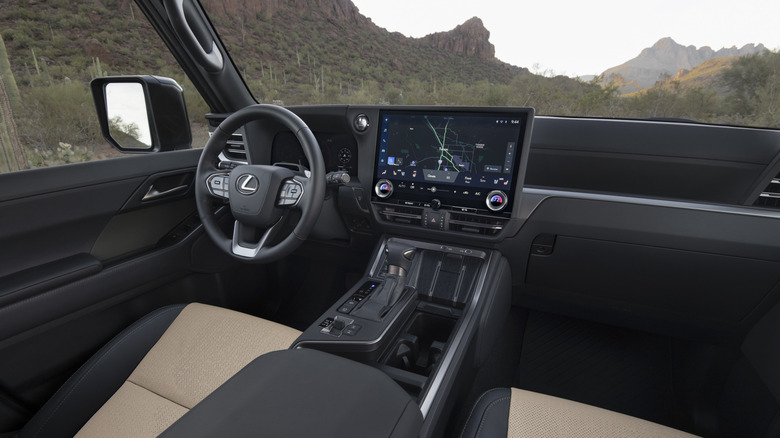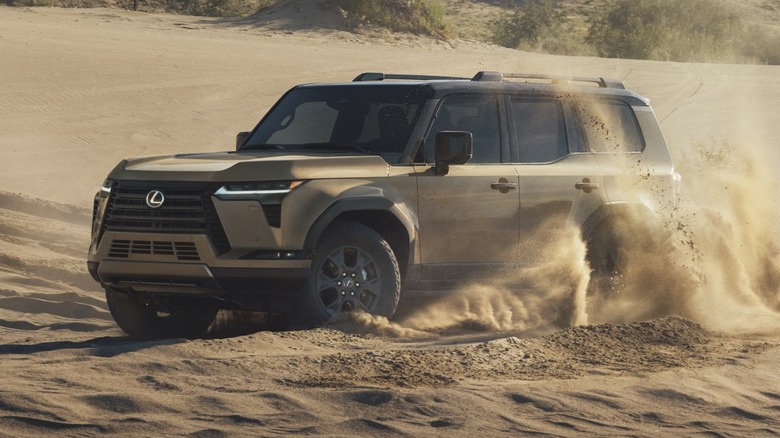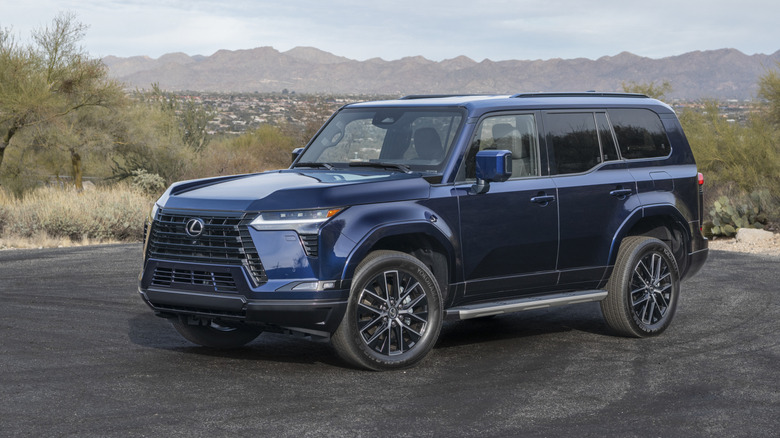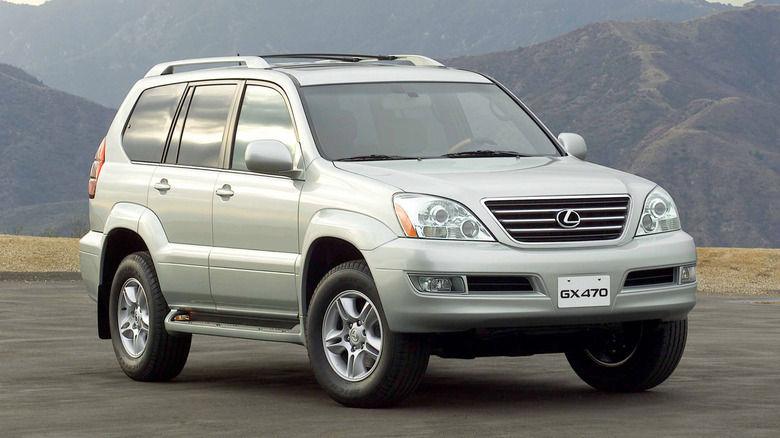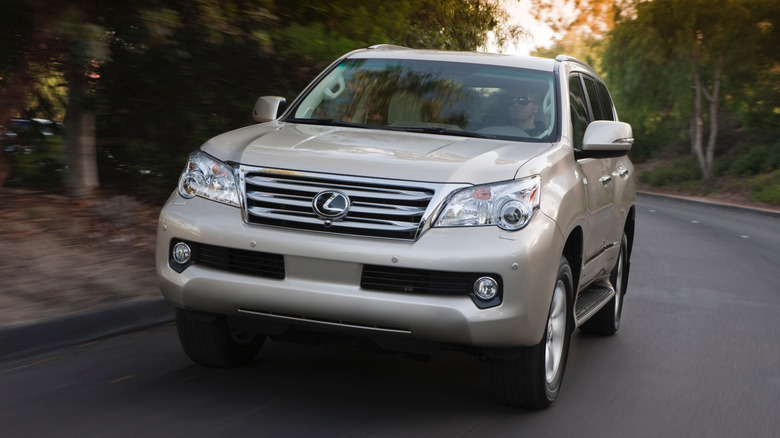10 Things You Should Know Before Buying A Lexus GX (New Or Used)
Lexus offers many SUVs in its current lineup, from the entry-level UX right up to the flagship LX. The GX sits toward the upper middle of that range, offering more all-terrain chops than the RX and TX, but without the six-figure price tag of the LX. The Japanese automaker recently launched the third generation of the GX, upgrading both the interior and exterior, but crucially not altering the core formula of the SUV. It's still capable, versatile, and competitively priced compared to its main rivals.
Despite its tough looks and burly powertrain, most new GX buyers won't be putting the car through its paces off-road. However, Lexus hasn't overlooked the fact that buyers of older examples are often much more keen to use its all-terrain capabilities, and accordingly, the latest GX remains talented both on and off the asphalt. Whether it's worth opting for the old-school previous generation or coughing up the cash for a new model comes down to a number of factors, but this roundup of the key differences between old and new should help you pick the best option for you.
The GX was overhauled for 2024
The we really liked the 2024 overhaul of the Lexus GX, from the updated interior and exterior styling, to the infotainment and safety tech, to the powertrain. Like older generations, it remains a body-on-frame SUV, sharing a platform with the larger LX and the Toyota Land Cruiser. The GX's styling looks quite Land Cruiser-like too, with boxier, classic proportions and a front fascia that's distinct from the rest of the Lexus SUV lineup.
This overhaul marked the first time that the GX had been significantly updated in around a decade and a half, and so it's fairly safe to assume that the latest generation will be around for the long run. Whether it will remain on sale for quite as long as the second generation remains to be seen.
It might look different, but the new model retains much of the older GX's charms. Like before, it offers a comfortable and capable way to tackle all kinds of terrain, as well as a comfortable experience on the road, although it's not as refined as Lexus' specifically road-oriented SUVs.
Prices start at $65,285 for 2025
The GX's starting price of $65,285 (including destination fees) puts it in the middle of Lexus' SUV lineup, although climbing up the trim range can quickly get costly. The base trim is the GX 550 Premium, with the next step up being the $69,750 GX 550 Premium+. From there, the GX 550 Overtrail trim represents the GX in its most off-road focused form, and costs at least $72,930, while the plusher GX 550 Overtrail+ costs $80,395.
Buyers wanting the most comfortable, fully-loaded version of the GX could opt for the appropriately named GX 550 Luxury trim, at $77,750, or the range-topping GX 550 Luxury+ at $81,750. Adding options to any of these trims can push the price notably higher, and with enough options ticked, a top-spec GX can exceed $90,000. Even then, the GX is still cheaper than an LX, which starts at $106,850 for 2025.
A 3.4-liter V6 engine is standard
All trims of the current Lexus GX come with a 3.4-liter twin-turbocharged V6 under the hood, which is mated to a 10-speed automatic transmission. Gone is the V8 of the previous generation, but in its place is a smaller, more powerful, and equally efficient engine that's capable of towing around 9,000 pounds. The exact number varies depending upon which trim buyers pick. The V6 churns out 349 hp and 479 lb-ft of torque, with the latter figure being a significant improvement over the previous generation's eight-cylinder engine.
Fuel economy still isn't great compared to other SUVs of a similar size, and it's not an improvement over the previous generation either. According to the EPA, the GX should achieve 17 mpg combined, 15 mpg in the city, and 21 mpg on the highway. That puts the cost of a tank of gas at $83 based on nationwide average prices, and will result in a fuel cost of $3,450 per year based on an annual mileage of 15,000 miles.
Every new GX features a 14-inch touchscreen
The old GX lacked the infotainment setup of its more recently updated rivals, and in later model years that became a major sticking point. Thankfully, buyers no longer have to put up with old-school interior tech in the latest GX. As standard, the SUV receives a 14-inch infotainment touchscreen with wireless Apple CarPlay and Android Auto capabilities, plus a 12.3-inch driver display.
Unlike some modern luxury SUVs, Lexus hasn't removed physical buttons from its cabin, and most of the common controls can still be adjusted without needing to use the touchscreen. As standard, the GX comes with a ten-speaker audio system, but an optional 21-speaker Mark Levinson system is available. Four or six charging ports are offered depending upon trim, and a wireless charger is available to juice up small devices like smartphones or earbuds. A head-up display is also available as an optional extra.
Its off-road abilities remain unchanged
It might have had an overhaul in every other aspect, but the familiar off-road chops of the GX remain unchanged for the latest generation. During a first drive of the car in 2024, SlashGear contributor Victoria Scott put a GX 550 Overtrail through its paces in the desert, and found it to be impressively capable. It was "so competent that it made off-road driving boring," negating much of the concentration and precision that would otherwise have been needed to coax lesser off-roaders over the same trails.
That will be very welcome news to buyers looking to score a used example when the latest generation depreciates to more affordable levels. The GX has garnered a reputation for being able to hang with the best off-roaders while also providing more comfort on the road than most of them, and that hasn't changed with the latest generation. Whether it's sand, mud, snow, or up to two feet of water, the GX will be able to handle it all with aplomb.
Plenty of safety features are offered as standard
The GX may remain highly capable off-road, but that doesn't mean Lexus has overlooked its on-road manners. We found it to be thoroughly competent when cruising in suburbia, even if its body-on-frame construction meant it lacked some of the refinement that the best German luxury SUVs offer. For added peace of mind, the GX also comes with a comprehensive suite of safety features courtesy of Lexus' Safety System+ 3.0.
The suite includes driver assistance features like road sign assist, adaptive cruise control, and lane tracing assist. That's in addition to the industry standard features common to virtually all new cars, like automatic emergency braking. Also available is traffic jam assist, which offers hands-free driving in slow-moving traffic, although it will require a monthly subscription to Lexus' Drive Connect package. Using the built-in cloud-enabled navigation and voice assistant will also require Drive Connect, although the former can also be used in offline mode without a subscription.
The new GX depreciates faster than other Lexus SUVs
Cars that become more valuable used than when they were new are rare — virtually all luxury SUVs depreciate over time, but compared to many of its German and American rivals, the Lexus GX holds its value well. According to KBB, the latest generation GX is forecast to retain 44.1% of its value over five years. In comparison, a BMW X5 will retain 37.3% of its value over the same time period, while an Audi Q5 will retain 36.2% of its value.
However, compared to other Lexus SUVs, the GX isn't quite as impressive. The larger, pricier LX is forecast to retain 49.9% of its sticker price over the same time frame, while Lexus' top performer, the RX, should keep 50.8%.
Whether the GX's depreciation rate is good news or not depends on whether you're looking to buy a new or used example — if it's the latter, you're in luck. Anyone willing to wait a few years for the latest GX generation to drop in price should be able to score a reasonably priced example, even if those prices are unlikely to hit the same lows as the GX's road-oriented German competitors.
The GX nameplate is two decades old
Lexus first launched the GX nameplate in 2002, targeting North American consumers looking for something larger and more off-road capable than an RX, but cheaper than an LX. Arriving in dealerships for the 2003 model year, the original generation featured a 4.7-liter V8 engine under the hood with 235 hp and 320 lb-ft of torque on offer. It remained in production until 2010, when it was replaced by the second generation model.
This second generation featured a new 4.6-liter V8 engine that was improved in every key metric over its predecessor. It achieved an EPA-estimated 17 mpg combined, while the first generation GX only averaged 15 mpg combined. The latest generation GX, as mentioned above, also achieves 17 mpg combined. The second generation churned out 301 hp and 329 lb-ft of torque, both improved figures over the first generation. Although it was subject to styling tweaks during its decade and a half on sale, the second generation GX remained unchanged underneath throughout that period.
The GX remains a consistently reliable used car
Keeping the oily bits of the first and second generation GX consistent throughout its production seems to have been a net benefit for the model's reliability, as across all model years it boasts a remarkably low number of recalls and complaints. Searching the NHTSA's database reveals that the 2004 model year GX has racked up the most complaints from owners, followed by the 2003 and 2007 models. However, even then, complaint levels remain impressively low, with even the most troublesome model year receiving only 83 complaints.
Recall levels also remain low across all model years, with the worst offender being the 2010 GX (pictured), which currently has five recalls issued. As of this writing, several model years are also subject to an open NHTSA investigation involving their Takata airbags, but this isn't a particular cause for concern.
Takata previously supplied airbags to virtually every major manufacturer, and a number of deaths have been reported involving defective components. The resulting investigation and subsequent recalls are still ongoing. Basically, this isn't a problem unique to the GX or Lexus, but rather an industry-wide issue.
The GX faces a lot of competition
While the GX is undoubtedly an appealing vehicle for anyone looking for a luxury off-roader, it isn't the only vehicle offering such versatility. The Land Rover Defender 110 is similarly capable, although it can't claim to have the same reputation for reliability as the GX. Then, there's the Toyota Land Cruiser, essentially the GX's Toyota-badged counterpart. It isn't as nice inside and it's still far from cheap, but budget-conscious buyers might still appreciate its lower starting price of $56,700 excluding fees.
Most first owners of the GX won't be looking to take their new car too far off the asphalt, if they ever do. In that case, German rivals like the BMW X5 and Audi Q7 are worth considering, alongside the cheaper and more refined Lexus RX crossover. The latter is also significantly more efficient than the GX thanks to its available hybrid powertrain. Finally, for buyers where budget isn't an issue, the flagship LX offers more power, more luxury, and equally impressive all-terrain chops. The LX might start at $15,000 more than a fully-loaded, top-spec GX, but few other SUVs offer such a compelling mix of off-road capability and on-road comfort.

